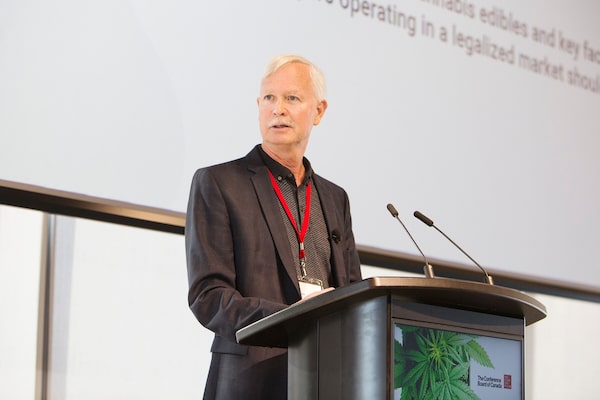Event summary produced by The Globe and Mail Events team. The Globe’s editorial department was not involved.
How has legalized recreational cannabis impacted the workplace? The Conference Board of Canada, in partnership with The Globe and Mail, hosted a full-day event in October to discuss key indicators one year post-legalization.
The event coincided with the launch of new Conference Board research that asked two main questions: how does employer maturity around cannabis impact the behavior of employees; and does cannabis have a positive or negative impact on the workplace?
The research shows medical cannabis is proving beneficial for workplaces, said Monica Haberl, senior research associate with The Conference Board during a presentation of the findings. “As long as it’s being authorized legitimately and dosed legitimately it can be seen to have some really positive [effects] both on workplace outcomes and personal outcomes.”

Conference Board of Canada presenters Monica Haberl and Bill Howatt discuss new research findings on cannabis in the workplace.Globe and Mail Events
Organizational maturity comes into play around cannabis policies, she noted. Employers with low maturity might have no cannabis policies, whereas high maturity employers have robust ‘fit for duty’ requirements and clear expectations around substance use and medical accommodation. Educational supports are also in place at these companies, along with the integration of cannabis policies into the organization’s broader occupational health, safety and wellness programs.
“What we found was [employees with] high maturity organizations perceive they have more employer support,” said Bill Howatt, chief of research, workplace productivity with The Conference Board. “Organizational resilience is not only what the employees do with their own health, it’s also what the employers do.”
The research shows cannabis users in high maturity organizations miss fewer days at work and are more productive, Ms. Haberl noted.
Lack of understanding
One of the key takeaways of the day was the apparent lack of knowledge about the effects of cannabis. Stigma still looms large – even for medical cannabis, said Dr. Melissa Snider-Adler, chief medical review officer with DriverCheck Inc.
“Forty-three per cent of [medicinal cannabis users] have not disclosed that to their employer,” she said, citing the new research. That might not be an issue for some employees, depending upon the type of job they have. Yet, many organizations have policies requiring employees to disclose use of medication or substances that could cause impairment on the job.

Dr. Melissa Snider-Adler of DriverCheck Inc. discusses the effects of cannabis and the persistent problem of stigma.Glenn Lowson/Globe and Mail Events
“How do you get people to come and disclose? It’s setting a different culture,” Dr. Snider-Adler said, referring to supportive workplace climates where employees don’t fear judgement or recrimination for their medical cannabis use. The right culture also supports employees dealing with stress, fatigue and mental health issues that can lead to recreational cannabis use as a coping strategy, she said.
Education and support resources are critical for cannabis, she said, because the effects of the substance are far more complex than the effects of other drugs, such as alcohol.
“We have no way of predicting and knowing [cannabis] impairment,” she said. Impairment varies by individual based on several factors, including the amount of tetrahydrocannabinol (THC), how it’s administered, the person’s metabolism, history of use, their endocannabinoid system and other elements, she noted.
She commented on the current "hype” surrounding cannabis and its touted benefits for just about every illness. She urged a cautious and informed approach for employers, advising them to ask if the employee has a valid authorization for medical cannabis, including the dose, expiration, and the THC limit. They might also ask if the prescribing physician is also the treating practitioner, and if the doctor has experience treating patients with medical cannabis, she said.
The arrival of edibles
Employers in safety-sensitive industries such as transportation have dealt with the legalization of cannabis in a similar way to how they’ve managed other substances such as alcohol, said Simon-Pierre Paquette, director of disputes resolution and labour standards with Canadian National Railway Company (CN), during a panel discussion. Employees can’t bring alcohol or cannabis onto the property, even if they bought it for use at home.
"The fact that something is legal doesn’t mean you have a right to bring it into the workplace,” Mr. Paquette said. CN also has designated employees ready to help staff who are stressed, having a bad day or need to talk. Yet, cannabis edibles pose new concerns.

Simon-Pierre Paquette, director of disputes resolution and labour standards with CN (foreground) comments on workplace cannabis policy.Glenn Lowson/Globe and Mail Events
"From a health and safety perspective, the biggest concern is edibles don’t function the same way,” he said. "We need to reach out to as many people as possible and raise awareness about what drugs do and don’t do, and when it’s particularly dangerous to consume them.”
Forensic toxicologist James Wigmore agreed, noting smoking cannabis is vastly different than eating it. "Edibles are like a different drug altogether,” he said. "The THC effects with smoking are usually felt within minutes…With edibles you don’t have that biofeedback. You eat it and nothing happens. You take a few more pieces and a few more pieces and what happens is they overdose,” Mr. Wigmore said.

James Wigmore, forensic toxicologist, shares insight on how cannabis edibles pose safety risks.Glenn Lowson/Globe and Mail Events
He added it takes 30 to 60 minutes and sometimes longer for the THC in edibles to take effect. That delay poses safety risks at work and on the road, because people might assume they’re fine to drive after consuming the product, he said. Half an hour later, they might be impaired behind the wheel.
Mr. Wigmore advised employers and the public to become more familiar with cannabis. Other speakers at the conference urged for employee educational resources and for employers to look to scientific evidence to support workplace decisions, such as if and how to include medical cannabis in drug coverage plans, navigating accommodation requests and shaping corporate policies.
Click here to view the full research report.